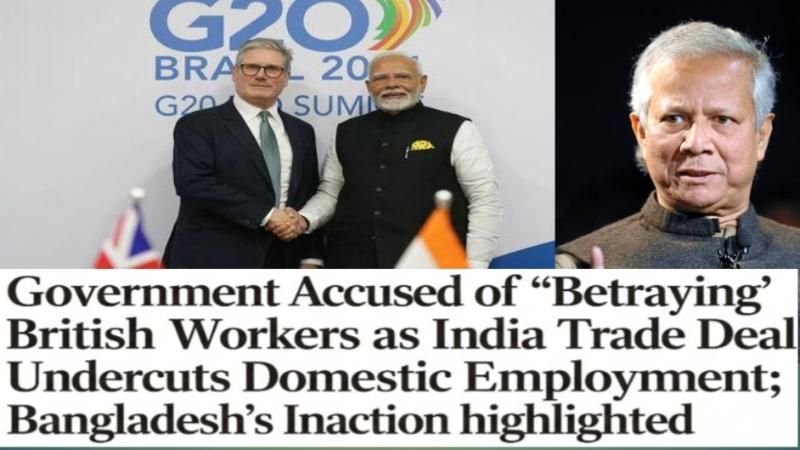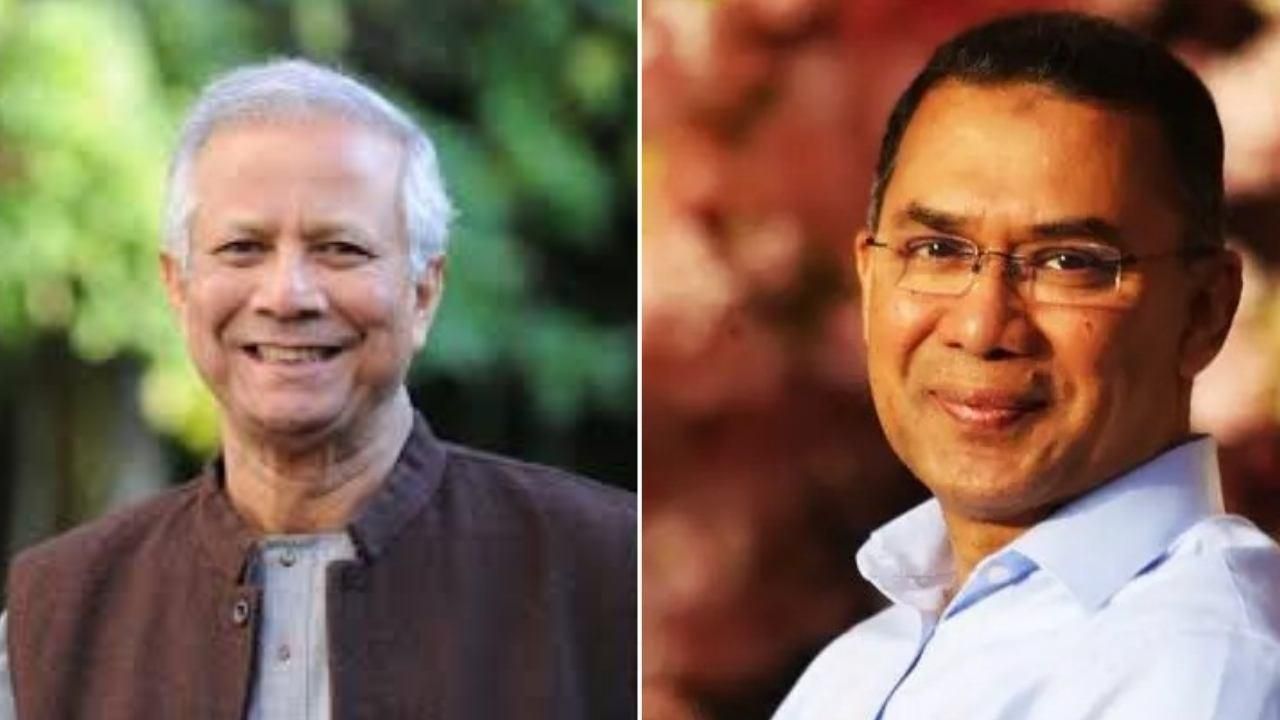Government Accused of "Betraying" British Workers as India Trade Deal Undercuts Domestic Employment; Bangladesh's Inaction Highlighted– The Labour government is facing a storm of criticism for a recently unveiled trade deal with India, which opponents argue will lead to a significant disadvantage for British workers. New data suggests the "Double Contribution Convention" (DCC) within the agreement could make it thousands of pounds cheaper for businesses to hire Indian nationals over their British counterparts, sparking fears of job displacement and a "two-tier" employment system, Daily Dazzling Dawn understands.
While Labour leader Keir Starmer has lauded the deal as a major economic boost for Britain, the hidden costs for British employment are now coming to light. The DCC exempts Indian businesses from paying National Insurance Contributions (NICs) to the Treasury on Indian workers seconded to the UK. This concession, calculated by the Tories, could translate into substantial tax cuts for firms importing Indian talent. For instance, a business seconding a software engineer from Delhi could save a staggering £11,168 in taxes compared to hiring a British equivalent from Doncaster.
Shadow Business and Trade Secretary Andrew Griffith condemned the findings, stating, "Labour's two-tier tax breaks for Indian secondees risks costing hardworking Brits dear. It could mean fewer opportunities and lower salaries for British workers. Two-tier Keir won't stand up for our country and can't deliver for the British people. Britain deserves better."
Another alarming example highlights an Indian firm saving as much as £7,211 by bringing over an IT adviser from Bangalore instead of hiring someone with similar skills from Birmingham. This disparity is largely attributed to the vast difference in average salaries; an IT adviser in India might earn £12,000 annually, compared to £52,000 in Britain. Even after factoring in the immigrant health surcharge, businesses stand to save over £6,000 by opting for an Indian worker.
Adding to the controversy, some employers have voiced frustrations that British workers are increasingly unwilling to undertake certain jobs, further complicating the domestic employment landscape and potentially incentivizing the hiring of foreign workers.
Despite a Treasury spokesman denying the calculations, a Freedom of Information request by the Express revealed that the department does hold estimates of the true cost of this tax giveaway to British taxpayers but is actively avoiding their publication. The Indian government, meanwhile, has hailed the DCC agreement as a "huge win" and an "unprecedented achievement," openly declaring it will "make Indian service providers significantly more competitive in the UK."
Beyond the considerable tax concession, the Home Office has also expanded the list of essential workers to include chefs, yoga teachers, and musicians from India, along with their dependents, further expanding the potential influx of Indian workers.
A government spokesperson maintains that "Indian nationals will not receive a tax break, and the agreement is restricted to a small number of highly-skilled, highly-paid professionals on temporary visas," asserting that the trade deal will boost the British economy by £4.8 billion and increase wages by £2.2 billion annually. However, critics remain unconvinced, fearing the long-term ramifications for British employment.
Bangladesh's Missed Opportunity and a Path Forward
Amidst this contentious debate, a pertinent question arises: Why hasn't Bangladesh, a Commonwealth nation with historical ties to the UK and a large pool of skilled labor, secured a similar advantageous trade agreement? The answer lies in a combination of internal governmental inertia and a failure to proactively engage in strategic diplomatic and economic negotiations.
Historically, Bangladesh has struggled with a consistent and strong diplomatic presence in London, often lacking the sophisticated lobbying and negotiation tactics required to secure such favorable terms. Unlike India, which has a powerful and well-resourced diplomatic corps actively pursuing its economic interests globally, the Bangladeshi government has, at times, appeared to lack the foresight and concerted effort needed to capitalize on such opportunities. This has led to a significant "messing up" of potential economic advantages for its citizens. The absence of a robust, proactive economic diplomacy strategy has meant that while India has secured a "huge win" for its service providers, Bangladesh has remained on the sidelines, its potential workforce unable to benefit from similar preferential treatment. This lack of initiative has cost Bangladesh valuable economic opportunities and its citizens the chance to access the lucrative UK job market under favorable terms.
In a timely development, Dr. Mohammad Younus, the interim Chief of the Bangladeshi government, is scheduled to visit the UK tomorrow and meet King Charles. This visit presents a unique and critical opportunity for Bangladesh to make a significant impact on this issue.
Bangladesh's Chief Advisor Muhammud Yunus is set to embark on his 11th official foreign visit in ten months, traveling to the UK from June 9-13. During his trip, Yunus will meet with King Charles III and might the British Prime Minister Keir Starmer.
During his visit, Dr. Younus should prioritize economic diplomacy. While meeting the King, he should subtly but firmly convey Bangladesh's keen interest in strengthening economic ties, particularly in the realm of labor mobility and trade agreements, expressing Bangladesh's desire for a "Double Contribution Convention" or a similar framework. He should emphasize the availability of a skilled and adaptable workforce in Bangladesh, particularly in sectors where the UK faces labor shortages, such as healthcare, IT, and hospitality, and present data on the quality and cost-effectiveness of Bangladeshi labor. Dr. Younus should formally propose a dedicated bilateral dialogue between the UK and Bangladesh, focusing on a comprehensive trade and labor mobility agreement, demonstrating a serious commitment from the Bangladeshi side. To allay any British concerns, he should implicitly assure the UK of Bangladesh's commitment to good governance, fair labor practices, and transparent processes for any future agreements, potentially discussing measures to prevent exploitation and ensure ethical recruitment. Finally, while the King's role is largely ceremonial, his endorsement of closer economic and diplomatic ties can create a positive environment and encourage the British government to take Bangladeshi proposals more seriously. Dr. Younus should leverage the historical bond and Commonwealth connection to garner the King's support for enhanced bilateral relations.If Dr. Yunus could manage to extract an announcement from the British government during his trip, promising special advantages for Bangladeshi students, researchers, and workers, that would be an unparalleled triumph for him.
By seizing this moment, Dr. Younus can signal a new era of proactive economic diplomacy for Bangladesh, potentially paving the way for agreements that could bring significant benefits to its workforce and economy, preventing further "missed opportunities."
It remains unconfirmed which British ministers Dr. Yunus is scheduled to meet during his trip, and whether a meeting with the British Prime Minister will take place. In response to inquiries, the Press Secretary at the Bangladesh High Commission in London informed to Daily Dazzling Dawn on Sunday afternoon that the visit's itinerary has yet to be finalized.
According to Nasrullah Khan Junaid, convener of Sammilito Peshajibi Parishad UK, "certain quarters" actively sought to cancel Dr. Yunus's interaction with the Bangladeshi community and a planned civic reception during his trip. Junaid further emphasized that should the Chief Adviser manage to elicit any encouraging pledge from the British government regarding Bangladesh's economic advancement—beyond merely accepting an award and engaging in routine engagements—it would undoubtedly represent a new landmark in his diplomatic achievements.








.svg)

